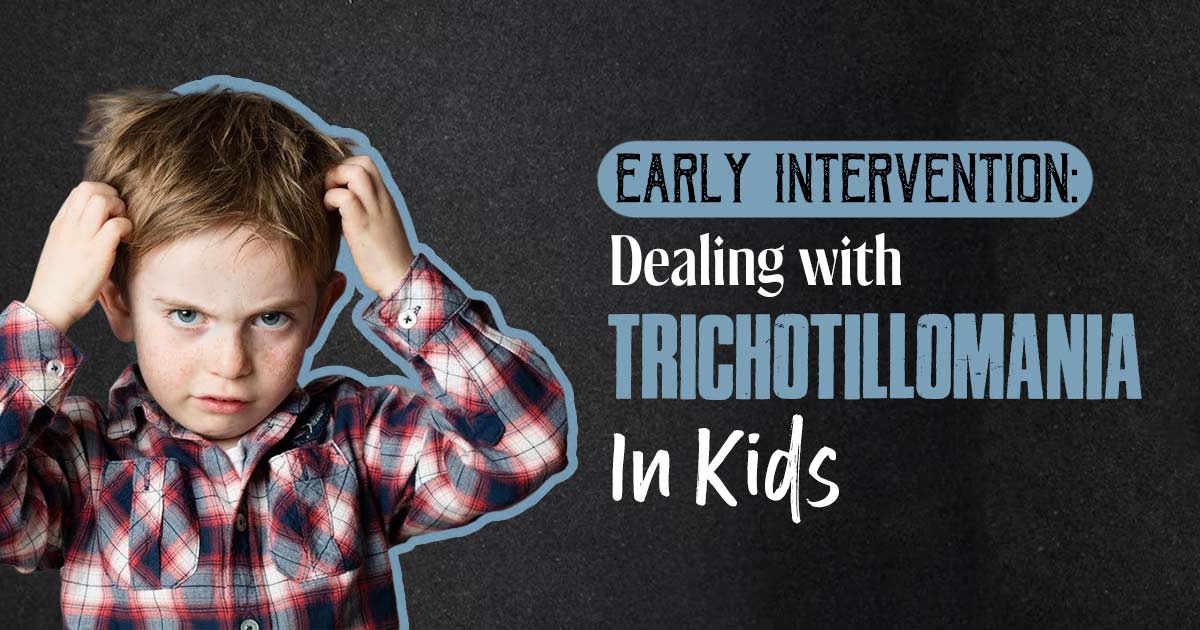Trichotillomania, often referred to as “hair-pulling disorder,” is a mental health condition characterized by the repetitive urge to pull out one’s hair. Although it is more commonly associated with adults, trichotillomania in children and toddlers is a serious issue. It leads to noticeable hair loss and potential physical and emotional distress.
Trichotillomania In Children And Toddlers
Trichotillomania is categorized as an impulse control disorder, falling under the broader umbrella of obsessive-compulsive and related disorders in the Diagnostic and Statistical Manual of Mental Disorders (DSM-5). In adults, it often involves the repetitive pulling of hair from the scalp, eyebrows, or eyelashes, but it can affect any area with hair. For children and toddlers, hair-pulling behavior can manifest in similar ways, although it may be less specific in terms of location due to a lack of understanding or self-awareness.
It’s important to distinguish between typical hair-pulling behaviors seen in infants and toddlers and the clinical condition of trichotillomania. Infants and young children may occasionally pull their hair or engage in exploratory behaviors without a significant underlying psychological issue. Trichotillomania, on the other hand, involves recurrent and chronic hair-pulling that causes distress and functional impairment.
Characteristics Of Trichotillomania In Children And Toddlers
Trichotillomania in children and toddlers presents several unique characteristics:
1. Limited Self-Awareness:
Young children, particularly toddlers, often lack the cognitive development to fully understand or communicate their emotions and behaviors. Consequently, they may not recognize that hair-pulling is abnormal or problematic.
2. Less Specific Hair Targets:
Unlike adults, children and toddlers with trichotillomania may not target a specific area for hair-pulling. They may pull hair from various regions of their body, such as the scalp, eyebrows, eyelashes, or even other body parts.
3. Lack Of Insight:
due to their developmental stage, young children are less likely to exhibit insight into their behavior. they may not express distress or concern about hair-pulling, making it challenging for parents and caregivers to identify the issue.
4. Emotional Expression:
Trichotillomania in children and toddlers can serve as a way to express or cope with emotions. It may be linked to anxiety, stress, frustration, or boredom, and serves as a form of self-soothing or emotional release.
5. Comorbidity:
Trichotillomania in children and toddlers may co-occur with other mental health conditions, such as generalized anxiety disorder or obsessive-compulsive disorder (OCD).
Causes Of Trichotillomania In Children And Toddlers
The exact causes of trichotillomania remain elusive, but it is believed to result from a combination of genetic, environmental, and neurobiological factors. Trichotillomania in children and toddlers may be influenced by several factors:
1. Genetic Predisposition:
Family history plays a significant role in the development of trichotillomania. Children with a family member who has the disorder are at a higher risk of developing it themselves.
2. Stress And Anxiety:
Children, even very young ones, can experience stress and anxiety. hair-pulling may be a way to cope with these emotions, providing temporary relief from internal distress.
3. Sensory And Tactile Stimulation:
Some children and toddlers may find the sensation of pulling hair comforting or soothing. this tactile stimulation can become a repetitive behavior over time.
4. Modeling Behavior:
Children often imitate the behaviors they observe in adults or older siblings. If they witness hair-pulling in their immediate environment, they may be more inclined to engage in similar actions.
Management And Support Of Trichotillomania In Children And Toddlers
Effectively managing and providing support trichotillomania in children and toddlers are essential to mitigate its impact on their well-being. Here are some key strategies for addressing this condition in young children:
1. Early Identification:
Parents and caregivers play a vital role in identifying and acknowledging hair-pulling behaviors in children. Observing the frequency and contexts in which the behavior occurs can help in early identification.
2. Seek Professional Help:
If hair-pulling behaviors persist or cause distress, it is crucial to consult a mental health professional. A child psychologist or psychiatrist can assess the child’s behavior and provide an accurate diagnosis.
3. Behavioral Therapy:
Cognitive-behavioral therapy (CBT), specifically habit reversal training (HRT), is often the primary treatment for trichotillomania in children and adults. HRT aims to replace hair-pulling with alternative, less harmful behaviors and teaches strategies to manage triggers and urges.
4. Parental Involvement:
Parents and caregivers should actively participate in the treatment process. They can reinforce positive behaviors, implement reward systems, and provide emotional support to the child.
5. Support Groups:
Support groups can be beneficial for parents and children alike. Connecting with others who are experiencing similar challenges can reduce feelings of isolation and provide valuable insights into managing trichotillomania.
6. Create a Safe Environment:
Minimize access to hair-pulling triggers, such as hair accessories or objects that may encourage the behavior. Create a safe and supportive home environment where the child feels comfortable discussing their feelings.
7. Teach Coping Skills:
Children can be taught alternative coping skills to manage stress, anxiety, and other emotional triggers. Techniques such as deep breathing, mindfulness, or sensory activities can be beneficial.
8. Medication:
In some cases, a mental health professional may recommend medication, such as selective serotonin reuptake inhibitors (SSRIs), to manage underlying anxiety or obsessive-compulsive symptoms that contribute to trichotillomania.
Trichotillomania in children and toddlers is a complex and challenging condition that requires understanding, patience, and appropriate support. Recognizing the unique characteristics of hair-pulling behaviors in young children and addressing them with early intervention and therapeutic strategies can significantly improve outcomes. It is crucial for parents, caregivers, and mental health professionals to work together to help children overcome trichotillomania, allowing them to grow and develop in a healthy and nurturing environment.






















